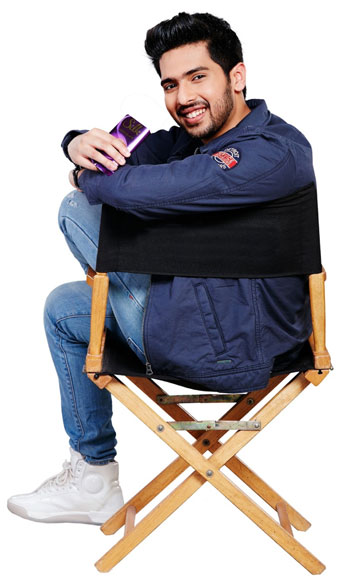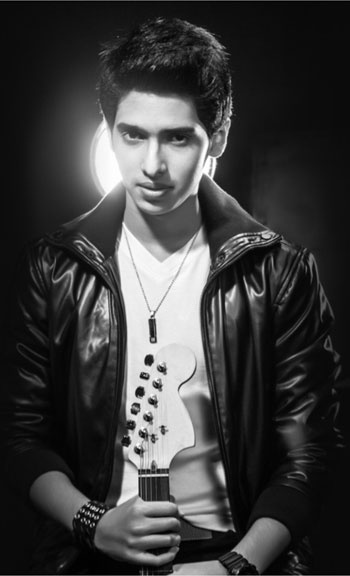Armaan Malik “I want to live up to my dadaji sardar malikji’s dream”
He shot to fame with the song ‘Main Hoon Hero Tera’ for the film Hero. He was just 18 when Universal Music India had launched Armaan Malik’s self-titled debut music album – Armaan, unveiled by Salman Khan along with prolific Salim-Sulaiman duo. Born on 22 July 1995, Armaan has now become a household name in India as a playback singer, composer and songwriter. Also, a finalist on Zee Tv’s Sa Re Ga Ma Pa L’il Champs – Armaan made his first on-screen appearance in a movie ‘Kaccha Limboo’ (2011).
 ARMAAN MALIK, in a tête-à-tête with JYOTHI VENKATESH talks about his well-marked journey in Bollywood and reveals about his stints as a singer in regional films including Tamil, Telugu and Marathi language.
ARMAAN MALIK, in a tête-à-tête with JYOTHI VENKATESH talks about his well-marked journey in Bollywood and reveals about his stints as a singer in regional films including Tamil, Telugu and Marathi language.
Tell me something about your maiden album Armaan?
I would like to thank everyone in Universal Music Group who believed in me as well as my music, and helped me along the way in bringing out my debut album. This album stands for me as my world. I’m very honoured to have Salim Merchant’s guidance as my mentor. And of course, thanks to my brother Amaal who put in tremendous hard work in producing the album.
What was Salim Merchant’s reaction when he met you for the first time?
Salim Merchant Sir met me for the first time when I was just eight/nine years old. He really felt that I had some talent in me. He also said that he fell in love with my honesty and somewhere sees himself in my brother. He could foresee a great future for me.
Let us know about the singers who have inspired and influenced you tremendously?
Well, it is a long list. The most pivotal ones that I can cite are Michael Bublé, Sonu Nigam, Chris Brown, Justin Bieber, Arijit Singh, Mohd. Rafisaab and Kishore Kumarji
What are the pros and cons of hailing from a known musical family of repute? Is it a bane or boon?
I think it’s challenging because people have huge expectations already imposed on your shoulders like a heavy burden but you also need to make an individual mark of your own in the industry. I mean you can’t go on living into someone’s shadow. I do agree that one gets to go through several doors of opportunities without much fuss than rank outsiders who doggedly slog for a chance from nowhere. But despite getting a key access to the right kind of people who matter most, you got to have that genuine talent and burning passion inside you to take things forward and make something valuable out of it!
Wasn’t ‘Main Hoon Hero Tera’ in Hero your first song as a playback singer in Hindi?
Though Main Hoon Hero Tera was my first hit song, it was for the film Jai Ho that I had sung two songs as my debut, after singing for jingles right from the time I was only 10. They were the title track and the song Love you till the End. Unfortunately the film did not do well and the songs too didn’t click and I had to wait for eight months at home.
How did you bag ‘Main Hoon Hero Tera’ after Jai Ho?
Salman Khan was sad that the song didn’t work and said he owed me and my brother Amal a movie and that’s how we got Main Hoon Hero Hero. Though initially it was recorded in my voice, Salman felt that he should use his stardom to make the song a hit and hence came out with his own version as a singer. It helped me too.
You also crooned the number Naina for Khoobsoorat!
Yes. It was for Fawad Khan’s debut film as a hero- Khoobsoorat that I sang the number Naina, just two days before the music of the film was launched. I should say that I became a singer out of default as my brother Amal composed the music and zeroed in on me since he could not get any singer free to sing the song.
Was Youth your maiden film as a singer in Marathi?
It was actually my second Marathi film for which I had sung my second Marathi song. Though I had sung for the first time for the Marathi film Kaul Manacha, Youth produced by Sundar Sethuraman and directed by Yogesh Pawar was the first film to be released with a song sung by me in Marathi.
What attracted you to say yes to the offer to sing for a Marathi film?
Marathi is a special language for me as I was born in Mumbai and it is the language of our state. I cannot speak in Marathi but surprisingly can sing in Marathi. The song is a great asset for me since it is a great song soaked in melody which is my forte as a singer.
 How tough was it for you to sing a song in Marathi?
How tough was it for you to sing a song in Marathi?
I did face a few difficulties with the pronunciation of some words and I had to go in for retakes. The song has a graph and it starts slow and goes to a crescendo with a high pitch in English. Frankly I didn’t expect a soft song to jump in scale. As a singer, it is very important for you to sing every song, whether you know the language or not. I cannot compromise on any song in any language.
In how many languages have you sung till date?
I have sung in Tamil, Kannada and Telugu too. It was with the Tamil film Payum Puli that I made my debut in Tamil with D Imaan as the music director. Tamil is the toughest regional language because it has tricky words and D Imaan’s tunes are tricky and difficult to grasp. I have also sung three songs for the Kannada film Siddharth which was the launch vehicle of the late Raajkumar’s grandson Vinay.
As the grandson of the legendary music director Sardar Malik, how difficult is it for you to carry on the legacy?
I used to spend a lot of time with my dada. It was he who taught me classical music. He taught me how to sing Ha Deewana Hoon Main and Saranga Teri Yaad Mein. I am happy I am taking the legacy of the Malik family ahead as the first singer in the family. I want to live up to my dada’s dream.
How do you describe today’s generation of music?
In black and white, today’s type of music is full of innovative ideas, experimental creativity, great sound production but of course, lacks the melodic value to a vast degree in order to make it potentially eternal and immortal in texture. However, all the songs that I have sung till date retain the above-mentioned ingredients including the vital melody intact.


